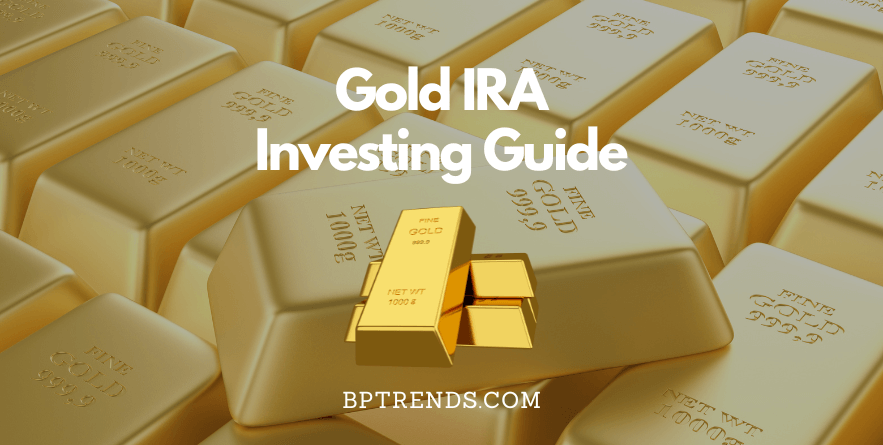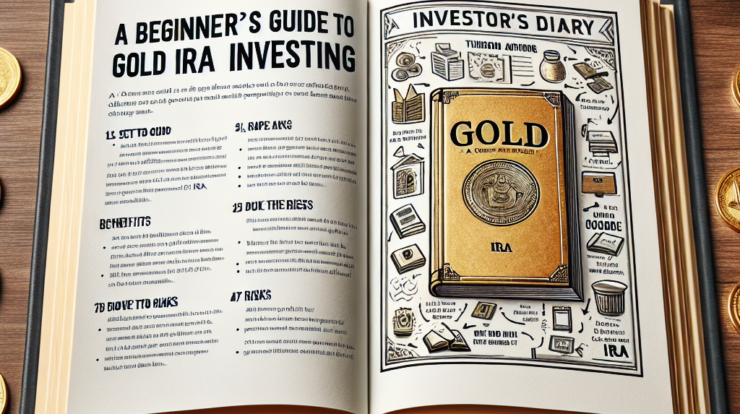
Are you looking for expert guidance on investing in a Gold IRA? Look no further! In this article, you’ll find invaluable advice from industry experts who specialize in gold IRA investing. Discover the key strategies and tips that can help you maximize your returns and protect your assets. Whether you’re a seasoned investor or new to the world of gold IRAs, this article will provide you with the knowledge and insights you need to make informed decisions and secure your financial future. So, let’s dive into the world of gold IRA investing and unlock the secrets of success!

Click here to understand the basics of gold investing
Understanding Gold IRA
investing in a Gold IRA can be a smart financial move, but in order to fully grasp its benefits and implications, it’s important to understand what a Gold IRA actually is. A Gold IRA, also known as a self-directed IRA, is a type of individual retirement account that allows you to hold physical gold and other precious metals as part of your portfolio. Unlike traditional IRAs that typically hold stocks, bonds, and mutual funds, a Gold IRA gives you the opportunity to diversify your retirement savings and protect your wealth against inflation and economic uncertainties.
Why invest in a Gold IRA?
There are several reasons why investing in a Gold IRA can be a wise decision. Unlike paper-based assets, such as stocks or bonds, gold has stood the test of time as a store of value. Throughout history, gold has been a sought-after asset, offering stability and serving as a hedge against inflation. By adding gold to your retirement portfolio, you can potentially reduce the overall risk and increase the diversification of your investments. Gold has also shown the ability to perform well during times of economic downturn, making it a valuable asset to have in your portfolio for protection.
Types of Gold IRAs
When it comes to Gold IRAs, there are different types to choose from, each with its own advantages and considerations. The most common types include:
-
Physical Gold IRAs: These allow you to hold physical gold coins or bars in your IRA. The advantage of physical gold is that you have direct ownership and can physically possess your investment.
-
Gold ETF IRAs: These involve investing in exchange-traded funds (ETFs) that are backed by physical gold. With this type of Gold IRA, you don’t own the physical gold directly, but rather, you own shares of an ETF that tracks the price of gold.
-
Gold Mining Stock IRAs: These involve investing in stocks of gold mining companies. While this type of investment is not directly tied to the price of gold, it allows you to potentially benefit from the performance of gold mining stocks.
Choosing the Right Custodian for Your Gold IRA
Importance of a reputable custodian
Selecting the right custodian for your Gold IRA is crucial, as they will be responsible for holding and safeguarding your precious metals. It is important to choose a reputable custodian that has experience and expertise in handling self-directed IRAs, specifically those involving gold. A reputable custodian will ensure that your assets are securely stored and can provide assistance with navigating any IRS regulations or reporting requirements.
Factors to consider when selecting a custodian
When choosing a custodian for your Gold IRA, there are several factors to consider. First and foremost, look for a custodian that is accredited and has a solid reputation in the industry. It is also important to consider the fees they charge for their services, as well as the level of customer support they provide. Additionally, consider whether the custodian offers the flexibility to invest in different types of precious metals and if they have secure storage facilities to protect your assets.

Learn why gold is considered a safe haven asset
Questions to ask a potential custodian
To ensure that you are choosing the right custodian for your Gold IRA, it is important to ask them relevant questions. Some key questions to consider include:
- What is your experience in handling Gold IRAs?
- How do you ensure the security and storage of the precious metals?
- What are your fees and costs?
- Do you offer assistance with IRS regulations and reporting requirements?
- Can I access my account online to monitor my investments?
- What is the process for selling or liquidating my investments if needed?
- Can you provide references or testimonials from satisfied clients?
Evaluating the Gold Company
Researching the company’s reputation
Before making any investment, it is always essential to research the reputation of the company you are considering. Look for reviews and ratings from reliable sources, such as the Better Business Bureau or industry publications. Take note of any complaints or negative feedback and consider how the company has responded to them. A reputable gold company should have a solid track record and a positive reputation within the industry.
Verifying the company’s credentials
In addition to reputation, it is important to verify the credentials of the gold company you are considering. Look for certifications or memberships in reputable organizations such as the Professional Coin Grading Service (PCGS) or the Numismatic Guaranty Corporation (NGC). These certifications can provide assurance that the company follows strict standards and practices when it comes to the authenticity and quality of their gold products.
Assessing the company’s customer service
Customer service is another important factor to consider when evaluating a gold company. A reliable company should have knowledgeable and friendly customer service representatives who are readily available to answer any questions or concerns you may have. Look for companies that have a strong commitment to customer satisfaction and are willing to go the extra mile to ensure your investment experience is positive.
Determining Your Investment Goals
Short-term vs. long-term goals
Before investing in a Gold IRA, it is important to determine your investment goals. Are you looking for short-term gains or a long-term hedge against inflation? Understanding your investment timeline will help guide your decisions and determine the appropriate allocation of funds within your portfolio.

Risk tolerance and diversification
Another important consideration when determining your investment goals is your risk tolerance. Gold can be a volatile asset, and its price can fluctuate significantly. It is crucial to assess your risk tolerance and determine how much volatility you can handle in your portfolio. Additionally, diversification is key to managing risk. Consider how gold fits into your overall investment strategy and ensure that you have a diversified portfolio that includes other asset classes.
Determining the right allocation of funds
When investing in a Gold IRA, it is essential to determine the right allocation of funds. This involves considering factors such as your age, financial goals, and risk tolerance. A general rule of thumb is to allocate a portion of your portfolio to gold, while still maintaining a diversified approach. The exact percentage will vary based on individual circumstances, but experts often recommend allocating around 5% to 15% of your portfolio to gold and other precious metals.
Understanding Gold IRA Rules and Regulations
IRS regulations for Gold IRA
When investing in a Gold IRA, it is important to understand the rules and regulations set forth by the Internal Revenue Service (IRS). The IRS provides guidelines on eligible metals, contribution limits, and distribution rules. For example, only certain types of gold and other precious metals, such as gold bars and coins, are eligible for inclusion in a Gold IRA.
Prohibited transactions
The IRS also prohibits certain transactions within a Gold IRA. It is important to be aware of these prohibited transactions to avoid any penalties or disqualification of your IRA. Some examples of prohibited transactions include using your IRA assets for personal gain, purchasing collectible coins, or conducting business with disqualified individuals or entities.
Tax implications and reporting requirements
Investing in a Gold IRA can have tax implications, so it is important to understand the tax rules and reporting requirements. If done correctly, a Gold IRA can provide tax advantages. For example, contributions to a traditional Gold IRA may be tax-deductible, while distributions from a Roth Gold IRA may be tax-free. It is important to consult with a tax professional to fully understand your specific tax situation and to ensure compliance with IRS regulations.
Types of Gold Investments for IRA

Physical gold bullion
physical gold bullion refers to bars or coins made of pure gold. These are popular options for Gold IRAs, as they provide direct ownership and can be easily liquidated if needed. Physical gold bullion is valued based on its weight and purity and can be an excellent addition to a diversified portfolio.
Gold coins and bars
Gold coins and bars are another popular option for Gold IRAs. These include coins such as American Eagle, Canadian Maple Leaf, and South African Krugerrand. Gold coins and bars are valued not only for their gold content but also for their numismatic or collectible value, which can potentially provide additional investment upside.
Gold exchange-traded funds (ETFs)
Gold ETFs are investment funds that trade on stock exchanges and represent shares of physical gold. These offer investors the opportunity to gain exposure to the price of gold without the need to physically own and store the gold. Gold ETFs provide flexibility and liquidity, as they can be easily bought and sold on the stock market.
Gold mining stocks
Investing in gold mining stocks involves buying shares of companies that are involved in the exploration, extraction, and production of gold. While this type of investment is not directly tied to the price of gold, it offers the potential for significant returns if the company is successful in its operations. However, investing in gold mining stocks carries its own unique set of risks and challenges, such as operational and financial risks.
Advantages of physical gold bullion
Investing in physical gold bullion offers several advantages. First and foremost, it provides direct ownership and allows you to have physical possession of your investment. Physical gold bullion is also highly liquid, meaning it can be easily bought or sold. Additionally, gold bullion has no counterparty risk, as it is not dependent on the performance of any financial institution.
Purchasing gold bars vs. gold coins
When investing in physical gold bullion, you have the option to purchase gold bars or gold coins. Gold bars are typically available in larger sizes and are valued based on their weight and purity. Gold coins, on the other hand, can be more accessible and may have additional numismatic or collectible value. Both options have their own advantages and considerations, and it is important to choose based on your personal preferences and investment goals.
Storing and insuring your gold
Once you have purchased physical gold bullion, it is essential to consider how you will store and insure it. There are various storage options available, including home safe deposit boxes, bank safe deposit boxes, or third-party storage facilities. Each option has its own pros and cons, and it is important to choose a secure and reliable storage option. Additionally, be sure to obtain adequate insurance coverage to protect your investment in case of theft, damage, or loss.
Choosing Gold Coins for Your IRA
Popular gold coins for IRAs
There are several popular gold coins that are commonly included in Gold IRAs. Some of these include the American Eagle, Canadian Maple Leaf, and South African Krugerrand. These coins are widely recognized and valued for their gold content and easily meet the IRS requirements for inclusion in a Gold IRA. It is important to choose coins that have a high level of purity and are recognized by reputable global markets.
Factors to consider when selecting gold coins
When selecting gold coins for your IRA, there are several factors to consider. First, ensure that the coins meet the IRS requirements for inclusion in a Gold IRA. Additionally, consider factors such as the coin’s weight, purity, and liquidity. It is also important to evaluate the reputation of the mint or manufacturer and whether the coin has any additional numismatic or collectible value.
Evaluating coin dealers
When purchasing gold coins for your IRA, it is crucial to choose a reputable and trustworthy coin dealer. Look for dealers who have been in business for a significant period and have a good reputation in the industry. Consider their certifications, memberships, and overall customer satisfaction. It is wise to compare prices and conduct thorough research on the dealer before making a purchase.
Exploring Gold ETFs for Your IRA
Understanding gold ETFs
Gold exchange-traded funds (ETFs) are investment funds that are traded on stock exchanges and designed to track the price of gold. Unlike physical gold, investing in gold ETFs provides exposure to the price of gold without the need for physical ownership. Gold ETFs are backed by physical gold held by a custodian, and investors own shares in the ETF that represent a fraction of an ounce of gold.
Benefits and drawbacks of investing in gold ETFs
Investing in gold ETFs offers several benefits. They provide diversification and flexibility, as they can be easily bought or sold on the stock market. Gold ETFs also eliminate the need for storage or insurance, as the physical gold is held by the custodian. However, there are some drawbacks to consider. Gold ETFs carry counterparty risk, as they are dependent on the financial stability of the custodian. Additionally, investing in gold ETFs may not provide the same emotional satisfaction as owning physical gold.
Top gold ETFs to consider
When exploring gold ETFs for your IRA, there are several top options to consider. Some popular gold ETFs include the SPDR Gold Shares (GLD), iShares Gold Trust (IAU), and Aberdeen Standard Physical Gold Shares (SGOL). These ETFs have a track record of performance, liquidity, and are backed by reputable custodians. It is important to evaluate the expense ratio, trading volume, and overall fit within your investment strategy when selecting a gold ETF.
Analyzing Gold Mining Stocks
Understanding gold mining stocks
Gold mining stocks represent shares of companies involved in the exploration, extraction, and production of gold. Investing in gold mining stocks offers the potential for significant returns if the company is successful in its operations. However, it is important to understand that gold mining stocks carry unique risks and challenges. The performance of these stocks is influenced not only by the price of gold but also by factors such as operational efficiency, management decisions, and geopolitical risks.
Factors to consider when investing in mining stocks
When analyzing gold mining stocks, it is important to consider factors such as the company’s financial health, mining operations, and management team. Evaluate the company’s track record and if they have a history of profitable production. Consider the company’s strategy for future growth and expansion, and assess their ability to navigate challenges within the mining industry.
Risks and challenges of investing in mining stocks
Investing in gold mining stocks involves risks and challenges that differ from investing in physical gold or gold ETFs. Some of these risks include operational risks, such as mine closures or delays in production, as well as geopolitical risks, such as changes in government regulations or political instability in mining regions. It is important to conduct thorough research and due diligence before investing in any specific gold mining stocks.
In conclusion, understanding the ins and outs of investing in a Gold IRA is crucial before making any financial decisions. By having a clear understanding of what a Gold IRA is, why it can be a smart investment, and the various types of Gold IRAs available, you can make informed choices that align with your investment goals and risk tolerance. Additionally, selecting the right custodian, evaluating the reputation of the gold company, determining your investment goals, understanding the rules and regulations, and exploring the different types of gold investments will further enhance your ability to successfully invest in a Gold IRA. Remember to always consult with a financial advisor or tax professional to ensure that you are making the best decisions for your specific financial situation.










